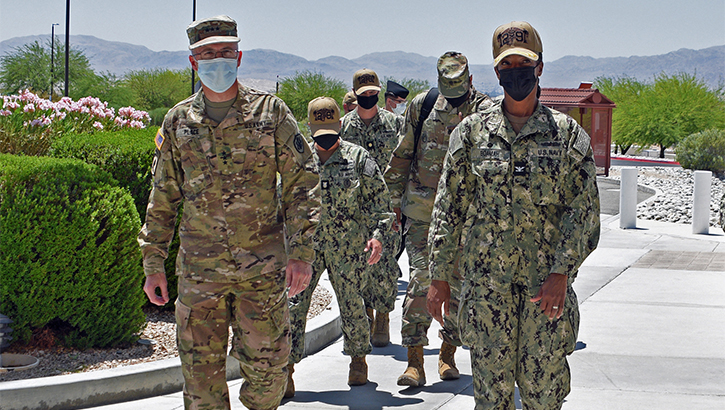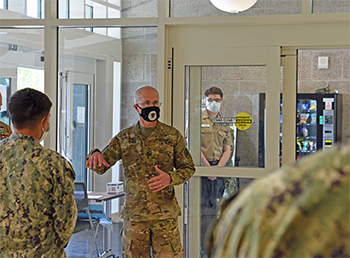DHA Director visits MCAGCC to hear from the ‘Boots on the Ground’
 Army Lt. Gen. Ronald Place, Defense Health Agency director, is escorted into Naval Hospital Twentynine Palms by Hospital Director, Navy Captain Lynelle Boamah. The DHA Director conducted a director’s call with hospital staff and met with the board of governors (Photo by: Dave Marks, Naval Hospital Twentynine Palms).
Army Lt. Gen. Ronald Place, Defense Health Agency director, is escorted into Naval Hospital Twentynine Palms by Hospital Director, Navy Captain Lynelle Boamah. The DHA Director conducted a director’s call with hospital staff and met with the board of governors (Photo by: Dave Marks, Naval Hospital Twentynine Palms).
Change is inevitable. Everyone knows it. No one likes it.
Army Lt. Gen. Ronald Place, Director of the Defense Health Agency has a sign in his office: "I'm good with change. You go first."
Place was aboard the Marine Corps Air Ground Combat Center on May 13 to meet with Marine Corps leadership in the morning, and with the Naval Hospital Twentynine Palms Board of Governors in the afternoon. His goal was to hear firsthand how seminal change, such as the MHS GENESIS electronic health record and the consolidation of Army, Air Force and Navy medicine into the Defense Health Agency is affecting boots on the ground.
Place, an Army surgeon, views change from a scientist's perspective. "The thing that matters most is healthcare delivery," he said. The challenge is to take the best of Army medicine, the best of Navy medicine the best of Air Force Medicine and figure out what can be standardized across the services while recognizing the cultures and traditions we support."
The DHA Director noted that under the new DHA construct, it's the warfighter and the concept of readiness that is central to the mission. While some military medical treatment facilities with high population densities and a surplus of sub-specialty choices in their surrounding areas are realigning to focus on active-duty readiness, Naval Hospital Twentynine Palms will continue to support its retiree population, as well as the family members of the Marines and sailors aboard the base – due to its isolated location.
 Army Lt. Gen. Ronald Place addresses the Navy corpsmen assigned to the Adult Medical Care Clinic, a Naval Twentynine Palms Hospital healthcare clinic that treats the Marines and sailors aboard the Marine Corps Air Ground Combat Center, the largest U.S. Marine Corps training base in the world, encompassing 1,100 square miles in the Mojave Desert in Southern California (Photo by: Dave Marks, Naval Hospital Twentynine Palms).
Army Lt. Gen. Ronald Place addresses the Navy corpsmen assigned to the Adult Medical Care Clinic, a Naval Twentynine Palms Hospital healthcare clinic that treats the Marines and sailors aboard the Marine Corps Air Ground Combat Center, the largest U.S. Marine Corps training base in the world, encompassing 1,100 square miles in the Mojave Desert in Southern California (Photo by: Dave Marks, Naval Hospital Twentynine Palms).
Place addressed the rise in telehealth encounters as a result of the COVID-19 pandemic. "For behavioral health, we have years of experience. We know what parts work well and what parts represent challenges. With that experience, we did very well during the pandemic," Place said. "But before I can sign off on virtual health in other areas, we have to figure out if face-to-face care versus a virtual environment offers the same or better outcome. We have to figure out what we're measuring and how to measure it before I can give it the thumbs up."
Place doesn't think the COVID-19 vaccine will become mandatory while it is still classified as an emergency-use authorization with the FDA. "I know of at least one manufacturer that has already made an application for full-licensure," he said. "If full license is granted, I wouldn't be at all surprised if it becomes just like the other vaccines that are fully licensed that we get as service members. So that's the future."
After a long day that started on one of the Combat Center's training ranges and ended at the naval hospital's Adult Medical Care Clinic (serving the active-duty population), the DHA Director was enthusiastic about his visit.
"After experiencing the interactions with the Marines when we were out in the urban training center and the sailors working inside this facility, it's very clear to us that this is a close-knit community that cares about how they support each other, how they can help each other, and how ultimately they can achieve complete success in every part of the organization," he said.
"Hats off to every single leader here, from the commanding general, to the squad leaders – every leader in this organization makes this culture happen. We were thrilled to be invited here and glad we could spend the day with the team."